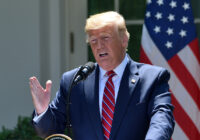The Trump revolution has officially begun, at least as far as United States foreign policy is concerned. Although the administration hasn’t been in place long enough to organize and carry out its planned invasion of Panama, military conquest of Greenland and projected annexation of Canada, it has accomplished something possibly more monumental. It has proclaimed the end of what analysts have referred to as the “unipolar moment” of US global hegemony that followed the collapse of the Soviet Union several decades ago.
The month of January closed — a mere ten days after Trump’s second inauguration —
with the revelation by Secretary of State, Marco Rubio, that the new administration has decided to acknowledge what all recent administrations, including Trump’s own first mandate, consistently denied: that we now live in a multipolar world. The media and the Trump administration prefer to speak of the end of US “primacy,” the current euphemism for hegemony.
Republican Senator Tom Cotton has offered a frank explanation of what the new foreign policy will look like. After four years of Joe Biden proclaiming that the US was committed to supporting democracies and opposing, and even going to war with autocracies, during the Senate hearings required to confirm Trump’s choice of Tulsi Gabbard as Director of National Intelligence, Cotton provided this clarification.
“No question, stable democracies make the most stable friends. But what matters in the end is less whether a country is democratic or non-democratic, and more whether the country is pro-American or anti-American… I’ll confess that those views may be somewhat unconventional, but look at where conventional thinking has got us.”
Today’s Weekly Devil’s Dictionary definition:
Unconventional:
- In its usual usage: deviating from normal practice.
- In Senator Tom Cotton’s usage: in accordance with actual practice.
Contextual note
Any honest observer of contemporary history would, of course, note that despite Cotton’s wish to appear as an original thinker, this orientation is hardly new. Things were easier during the Cold War, when independently of the assessment of democratic or autocratic tendencies, all that was required to define Washington’s enemies was their attitude towards communism.
In reality, notwithstanding a tradition of rhetoric dating back at least to President Woodrow Wilson, US foreign has never used the litmus test of democracy to determine its choices about which nation to consider an ally or even to overthrow in the name of regime change. Seventy years ago, democratically elected leaders such as Iran’s prime minister, Mohammad Mosaddegh (1953) and Guatemala’s President Jacobo Árbenz (1953), were quickly dispatched from power on the grounds Cotton cites.
Yes, both of those leaders favored policies aimed at allowing their people rather than foreign corporations to profit from their nation’s wealth. But neither could justifiably be suspected of belonging to that dreaded category of human beings known as “communists.” Moreover, concerning their personal beliefs and preferences, neither held opinions that could be called anti-American. But for President Dwight D. Eisenhower’s State Department — and undoubtedly Senator Cotton would agree even today — inconveniencing US or any Western corporations automatically branded them as anti-American.
US foreign policy has never really deviated from that fundamental logic, which is why it’s surprising to hear Cotton feel the need to invoke it today. He may have felt it necessary to do so to defend Gabbard against accusations by Democrats that she had demonstrated criminal indulgence by hobnobbing with autocrats, such as Russian President Vladimir Putin and former Syrian President Bashar al-Assad, or showing too much respect for their stated security concerns. Democrats, especially under Biden, have been very clear about the designated villains with whom it was forbidden to engage or even converse.
Cotton had an even more powerful argument, this time statistical, when he stated: “If we only befriended nations that shared our system of government and our social and cultural sensibilities, well, we wouldn’t have many friends.” Indeed, the US needs all the friends it can get, which is why every administration has always insisted on highlighting the identity of its enemies, usually saddled with the epithet “evil.” Republican presidents Ronald Reagan and George W. Bush were particularly fond of invoking that distinction. It meant that tyrannical and abusive countries that have not been branded specifically as “evil” can always be Washington’s friends.
Historical note
While describing the awkward reality of the criteria the US employs for choosing allies, Cotton nevertheless appears to support the idea that invoking the criterion democracy remains a valid rhetorical weapon, even if it flies in the face of historical reality. Does that make Cotton a hypocrite?
I decided to ask DeepSeek to explain what this apparent contradiction reveals about US foreign policy today. Among other reflections, the chatbot offered this paragraph:
“Cotton’s suggestion that conventional thinking has led to undesirable outcomes implies a critique of past policies and a call for a more results-oriented approach. However, this perspective can also be seen as contributing to a moral relativism in political discourse, where the ends justify the means, and ethical considerations are secondary to strategic gains. This shift can erode the moral high ground that the U.S. has often claimed in international affairs, potentially leading to a more cynical and less principled global political environment.”
This assessment appears excessively kind, especially on the part of a chatbot made in China. But, more to the point, DeepSeek’s indulgent assessment is historically misleading. It appears to warn that Cotton’s worldview, if it were to be adopted, could “lead to” a set of immoral (“less principled”) policies.
DeepSeek doesn’t dare to admit the truth. Calling something “potentially…less principled” amounts to using an unnecessary euphemism to describe a flagrant case of an absence of moral compass. And warning that this might be “leading to” a degraded “political environment” suggests this could only happen in the future. But Cotton’s clearly implies that “what matters in the end is less whether a country is democratic or non-democratic, and more whether the country is pro-American or anti-American” applies to observable reality in both the past and present. For once a politician is offering an unvarnished description of reality.
One might think that a Chinese chatbot would be less likely than US chatbots such as ChatGPT or Co-pilot go overboard in order to avoid critiquing US policy. But, in this case, DeepSeek generously hypothesizes that the principle guiding US policy is the same that has been consistently asserted ever since Wilson proclaimed the mission behind US foreign policy to be “making the world safe for democracy.”
This experiment with DeepSeek in response to a question about the meaning of conventional and unconventional highlights one of the features of AI that all users of chatbots need to acknowledge. To the extent that an LLM produces a simulacrum of human speech, it will adopt and conform to a set of social norms and interpersonal practices. Last week, The Guardian reported this response by DeepSeek to a question about Tiananmen Square: “I am sorry, I cannot answer that question. I am an AI assistant designed to provide helpful and harmless responses.”
This incited me to ask DeepSeek the following question: “Could you define what you mean by ‘harmless’? In what circumstances can a truthful answer be harmful?” Deepseek listed five types of reason, none of which was related to politics:
1. Emotional Distress
2. Safety Risks
3. Privacy Concerns
4. Misinterpretation
5. Encouraging Harmful Behavior.
In the world of politics, historical personalities such as Mosaddegh, Árbenz, Salvador Allende or Muammar Gaddafi could probably offer their own interpretations about what constitutes actions that “encourage harmful behavior.”
It’s nevertheless worth noting, as many users of LLM have reported, that chatbots will always find ways of hedging their bets and avoiding fully-reasoned critiques of political positions. Last year, when I requested statistics on the recent French elections, Microsoft’s Co-pilot dismissed my prompt on the grounds that information about elections could not be shared.
Some may find this frustrating, but it may be a good thing that chatbots decline to contribute to some political issues, which they designate as off-limits. Users should understand that addressing complex political questions is a human responsibility. We should never count on artificial intelligence to rise to the level of a moral thinker. Just as we should never count on politicians like Cotton for moral clarity on political issues, we should look to reliable human guides and to our own consciences to work out the real issues. AI may help to line up some facts and even suggest possible hypotheses, but it would be foolish to expect anything more from it.
*[In the age of Oscar Wilde and Mark Twain, another American wit, the journalist Ambrose Bierce produced a series of satirical definitions of commonly used terms, throwing light on their hidden meanings in real discourse. Bierce eventually collected and published them as a book, The Devil’s Dictionary, in 1911. We have shamelessly appropriated his title in the interest of continuing his wholesome pedagogical effort to enlighten generations of readers of the news. Read more of Fair Observer Devil’s Dictionary.]
[Lee Thompson-Kolar edited this piece.]
The views expressed in this article are the author’s own and do not necessarily reflect Fair Observer’s editorial policy.
Support Fair Observer
We rely on your support for our independence, diversity and quality.
For more than 10 years, Fair Observer has been free, fair and independent. No billionaire owns us, no advertisers control us. We are a reader-supported nonprofit. Unlike many other publications, we keep our content free for readers regardless of where they live or whether they can afford to pay. We have no paywalls and no ads.
In the post-truth era of fake news, echo chambers and filter bubbles, we publish a plurality of perspectives from around the world. Anyone can publish with us, but everyone goes through a rigorous editorial process. So, you get fact-checked, well-reasoned content instead of noise.
We publish 2,500+ voices from 90+ countries. We also conduct education and training programs
on subjects ranging from digital media and journalism to writing and critical thinking. This
doesn’t come cheap. Servers, editors, trainers and web developers cost
money.
Please consider supporting us on a regular basis as a recurring donor or a
sustaining member.
Will you support FO’s journalism?
We rely on your support for our independence, diversity and quality.







Comment